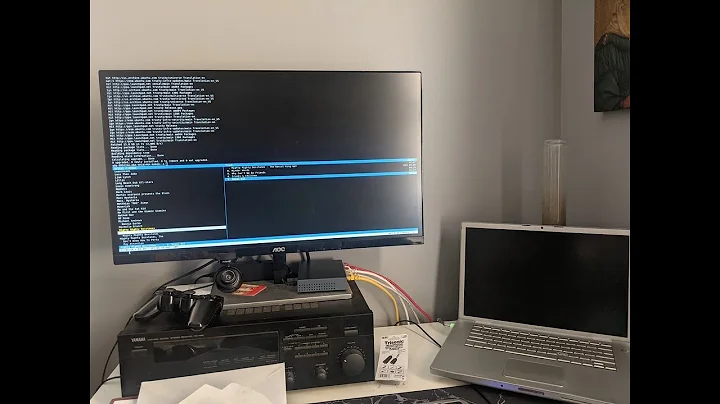PulseAudio not detecting any devices
Solution 1
In my case, pulseaudio only showed dummy devices, it stop showing my Intel audio devices after installing some packages.
So I followed these steps: The only device shown is "dummy output" or newly connected cards are not detected
To see which application is responsible for direct access to the sound card through alsa, run the following command:
sudo fuser -v /dev/snd/*
In my case it was timidity-daemon:
USER PID ACCESS COMMAND
/dev/snd/controlC0: root 659 f.... alsactl
timidity 762 F.... timidity
/dev/snd/pcmC0D0p: timidity 762 F...m timidity
/dev/snd/seq: timidity 762 F.... timidity
/dev/snd/timer: timidity 762 f.... timidity
So i just uninstall the conflicting package and thats it.
Solution 2
You may have installed some (seemingly) innocuous audio program/daemon that takes control of the hardware before the user-space subsys is initialized. Had a similar issue after installing the 'sqeezelite' package but others can probably do the same thing or something equally troublesome; like using a different sound server target in their .conf or startup script.
These scenarios derive from
- installing mixed gstreamer 0.10 & 1.00 libraries (recommend 0.10)
- installing multiple sound server backends (such as PortAudio which has 'pa*' and '*-pa' named subsystems just like PulseAudio)
- customized port-mappings in alsa (aconnectgui, hdajackretask, auto-configured, etc.)
- zealous power-management settings
- device proxies for virtual machine host pass-through devices
- misconfigured 'media-key(s)' or other hardware issue
These are just some possible causes; your question gave little information (specifically, 'alsa' is installed and running) to for anyone to offer a specific solution. The information provided is based mostly on experience and just a bit of speculation (power management & media key issues). The screen caps don't mean much for folks using other X desktops or distros. The command 'aplay -l' does show that alsa is running but doesn't give the detail of:
aplay -L
default
Playback/recording through the PulseAudio sound server
null
Discard all samples (playback) or generate zero samples (capture)
pulse
PulseAudio Sound Server
sysdefault:CARD=Intel
HDA Intel, ALC889 Analog
Default Audio Device
front:CARD=Intel,DEV=0
HDA Intel, ALC889 Analog
Front speakers
surround21:CARD=Intel,DEV=0
HDA Intel, ALC889 Analog
2.1 Surround output to Front and Subwoofer speakers
surround40:CARD=Intel,DEV=0
HDA Intel, ALC889 Analog
4.0 Surround output to Front and Rear speakers
surround41:CARD=Intel,DEV=0
HDA Intel, ALC889 Analog
4.1 Surround output to Front, Rear and Subwoofer speakers
surround50:CARD=Intel,DEV=0
HDA Intel, ALC889 Analog
5.0 Surround output to Front, Center and Rear speakers
surround51:CARD=Intel,DEV=0
HDA Intel, ALC889 Analog
5.1 Surround output to Front, Center, Rear and Subwoofer speakers
surround71:CARD=Intel,DEV=0
HDA Intel, ALC889 Analog
7.1 Surround output to Front, Center, Side, Rear and Woofer speakers
iec958:CARD=Intel,DEV=0
HDA Intel, ALC889 Digital
IEC958 (S/PDIF) Digital Audio Output
dmix:CARD=Intel,DEV=0
HDA Intel, ALC889 Analog
Direct sample mixing device
dmix:CARD=Intel,DEV=1
HDA Intel, ALC889 Digital
Direct sample mixing device
dsnoop:CARD=Intel,DEV=0
HDA Intel, ALC889 Analog
Direct sample snooping device
dsnoop:CARD=Intel,DEV=1
HDA Intel, ALC889 Digital
Direct sample snooping device
hw:CARD=Intel,DEV=0
HDA Intel, ALC889 Analog
Direct hardware device without any conversions
hw:CARD=Intel,DEV=1
HDA Intel, ALC889 Digital
Direct hardware device without any conversions
plughw:CARD=Intel,DEV=0
HDA Intel, ALC889 Analog
Hardware device with all software conversions
plughw:CARD=Intel,DEV=1
HDA Intel, ALC889 Digital
Hardware device with all software conversions
-and-
lspci -b -vv
00:1b.0 Audio device: Intel Corporation 82801JI (ICH10 Family) HD Audio Controller
Subsystem: Gigabyte Technology Co., Ltd GA-EP45-UD3R Motherboard
Control: I/O- Mem+ BusMaster+ SpecCycle- MemWINV- VGASnoop- ParErr- Stepping- SERR- FastB2B- DisINTx+
Status: Cap+ 66MHz- UDF- FastB2B- ParErr- DEVSEL=fast >TAbort- <TAbort- <MAbort- >SERR- <PERR- INTx-
Latency: 0, Cache Line Size: 4 bytes
Interrupt: pin A routed to IRQ 10
Region 0: Memory at fdff8000 (64-bit, non-prefetchable)
Capabilities: [50] Power Management version 2
Flags: PMEClk- DSI- D1- D2- AuxCurrent=55mA PME(D0+,D1-,D2-,D3hot+,D3cold+)
Status: D0 NoSoftRst- PME-Enable- DSel=0 DScale=0 PME-
Capabilities: [60] MSI: Enable+ Count=1/1 Maskable- 64bit+
Address: 00000000fee0300c Data: 4172
Capabilities: [70] Express (v1) Root Complex Integrated Endpoint, MSI 00
DevCap: MaxPayload 128 bytes, PhantFunc 0
ExtTag- RBE-
DevCtl: Report errors: Correctable- Non-Fatal- Fatal- Unsupported-
RlxdOrd- ExtTag- PhantFunc- AuxPwr- NoSnoop+
MaxPayload 128 bytes, MaxReadReq 128 bytes
DevSta: CorrErr- UncorrErr- FatalErr- UnsuppReq- AuxPwr+ TransPend-
Capabilities: [100 v1] Virtual Channel
Caps: LPEVC=0 RefClk=100ns PATEntryBits=1
Arb: Fixed- WRR32- WRR64- WRR128-
Ctrl: ArbSelect=Fixed
Status: InProgress-
VC0: Caps: PATOffset=00 MaxTimeSlots=1 RejSnoopTrans-
Arb: Fixed- WRR32- WRR64- WRR128- TWRR128- WRR256-
Ctrl: Enable+ ID=0 ArbSelect=Fixed TC/VC=01
Status: NegoPending- InProgress-
VC1: Caps: PATOffset=00 MaxTimeSlots=1 RejSnoopTrans-
Arb: Fixed- WRR32- WRR64- WRR128- TWRR128- WRR256-
Ctrl: Enable+ ID=1 ArbSelect=Fixed TC/VC=80
Status: NegoPending- InProgress-
Capabilities: [130 v1] Root Complex Link
Desc: PortNumber=0f ComponentID=02 EltType=Config
Link0: Desc: TargetPort=00 TargetComponent=02 AssocRCRB- LinkType=MemMapped LinkValid+
Addr: 00000000fed1c000
Kernel driver in use: snd_hda_intel
A very nice pulseaudio troubleshooting guide here:
https://wiki.archlinux.org/index.php/PulseAudio/Troubleshooting
Related videos on Youtube
user2394156
Updated on September 18, 2022Comments
-
user2394156 over 1 year
While using my laptop, at some point I noticed that my internal laptop microphone wouldn't work (but it was listed in Sound Settings -> Input) so I restarted my machine and then poof - PulseAudio detects no Output and no Input devices:
I have no idea what caused this. I fail to remember doing anything abnormal prior to devices not being detected anymore.
How can I fix this?
aplay -loutput:**** List of PLAYBACK Hardware Devices **** card 0: PCH [HDA Intel PCH], device 3: HDMI 0 [HDMI 0] Subdevices: 1/1 Subdevice #0: subdevice #0 card 0: PCH [HDA Intel PCH], device 7: HDMI 1 [HDMI 1] Subdevices: 1/1 Subdevice #0: subdevice #0 card 0: PCH [HDA Intel PCH], device 8: HDMI 2 [HDMI 2] Subdevices: 1/1 Subdevice #0: subdevice #0-
user2394156 over 7 yearsI'm using Ubuntu 16 btw.
-
-
 Videonauth over 7 yearsWelcome to Ask Ubuntu! While this may theoretically answer the question, it would be preferable to include the essential parts of the answer here, and provide the link for reference.
Videonauth over 7 yearsWelcome to Ask Ubuntu! While this may theoretically answer the question, it would be preferable to include the essential parts of the answer here, and provide the link for reference. -
kometonja almost 4 yearsThis helped me after upgrading to (K)Ubuntu 20.04
-
Guillaume Cisco almost 4 yearsYou made my day, I spent hours debugging this issue, and after all I simply removed timidity and it works as before
-
Trendfischer almost 3 yearsUpgrading to 20.04 caused it for me too, thanks for the help, the command
sudo apt install timidity-daemonsolved it.






![Fix Kazam Audio problem in Linux 2020.X [Audio not detected]](https://i.ytimg.com/vi/ev5sP_BHZdw/hq720.jpg?sqp=-oaymwEcCNAFEJQDSFXyq4qpAw4IARUAAIhCGAFwAcABBg==&rs=AOn4CLBxAi51bVwVS6JoffEjhsqwN5xa1w)

